Ferrari F40
/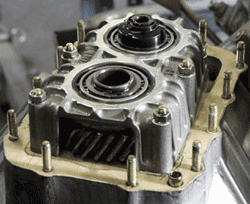
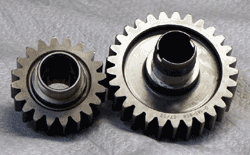
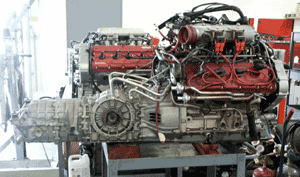
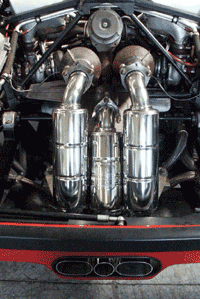
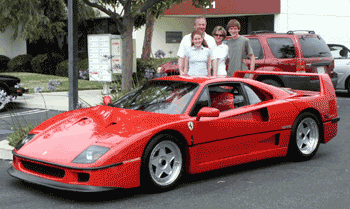
The Ferrari F40 was the last new Ferrari model introduced by Enzo Ferrari before his death in August of 1988. As the fastest production car of it's time, the F40 quickly became the ultimate super car of the 1980's and put an end to the adage that a true Ferrari had CAROBU Ferrari F40 engine had to have 12 cylinders. Michelotto and Pozzi Ferrari France (the French Ferrari importer) developed racing versions of the F40 known as the F40LM, and the F40 GTE, that were campaigned with some success in the US IMSA race series. F40s were actively campaigned in professional endurance racing up until 1996 and many of these super-Ferraris continue to be raced in many gentlemen racing series even today. After 17 years since it's debut in June of 1987, the F40 has retained legendary status and the purposeful lines originally penned by Pininfarina still remain fresh and passionate.
The 81.9 mm bore and 69.5 mm stroke of the 2936 cc turbocharged engine, known as the Tipo 120A, was a direct derivative of the Ferrari V-8 first debuted in the Dino 308 GT/4 nearly 14 years earlier. The addition of twin water-cooled IHI RHB 53LW turbochargers combined with twin Behr intercoolers allowed for forced-induction of 1.1 bar (16.1 psig) resulting in factory quoted power output of 478 bhp at 7000 rpm and peak torques of 425 lb-ft at 4500 rpm. Twin Weber/Marelli IAW units, one for each bank, control the fuel injection and ignition systems insuring efficient and safe operation of the engine with 7.7:1 compression ratio. The single wastegate, controlled by one of the IAW units, discharges directly to atmosphere resulting in the characteristic 3-pipe exhaust exiting in the center of the car. Later, for the F40 GTE, Michelotto developed the even more radical Tipo F 120B engine with up to 3.6 liter displacement and power outputs of nearly 800 hp.
Performance Figures by Road and Track (October 1989) claim a 0-60 mph time of 4.5 seconds with 100 mph after only 8.2 seconds. The F40 completes the ¼ mile in 11.6 seconds and reaches a top-speed of 198 mph. These performance claims result in a calculated horsepower of approximately 440 bhp, a little shy of the factory claims (Click here for a discussion of calculated power figures). Carobu Engineering dyno results for a stock, non-freshened F40 engine are 468 bhp @ 7200 rpm and 390 lb-ft @ 4500 rpm utilizing the stock engine management system. Forza magazine (December 2002) reported chassis dyno test results of 455 bhp at 6,650 rpm at the rear wheels for an F40 equipped with Carobu Engineering's Razzo Rosso LM computer chip and a Tubi Competition exhaust .
The mighty Michelotto F40 LMs campaigned by Pozzi and other Ferrari racing customers were equipped with larger turbos (running up to 38 psig of boost), a large radiator air outlet in the center of the front lid for improved cooling, a front spoiler, and adjustable rear wing and larger diameter wheels. Upgrading the stock F40 with "LM turbos" has become a popular upgrade with Carobu Engineering's F40 customers. The "LM turbos," have larger IHI compressors mated to the stock F40 turbines.
In order to fully exploit the power available from the LM turbos, it is necessary upgrade the computer-code of the Weber/Marelli management system. Carobu Engineering developed the Razzo Rosso computer chips for the F40 LM kit in order to optimize the boost control, fuel delivery and ignition timing. The result of the F40 LM turbo upgrade is considerable. Running only 20 psig boost, peak power increased to 511 bhp @ 6700 rpm and peak torque of 422 lb-ft @ 5900 rpm for the Carobu development engine. This is an increase of nearly 10% in peak power and peak torque over the baseline engine results. More remarkable is that the engine now has over 400 lb-ft of torque between 4200 rpm and 6700 rpm.
Since most customer F40s, even on track days, seldom require the nearly 200 mph terminal speed of the F40. Carobu Engineering developed the Razzo Rosso F40 Drop Gear set in order to improve the acceleration and drivability of our customer F40s. The gear set is forged and machined exclusively for Carobu Engineering by one of the finest European gear manufacturers and reduces the final drive ratio by 9%. For the race F40, or serious street F40, Carobu has developed the Razzo Rosso aluminum flywheel with multi-disc racing clutch package that reduces rotating mass by 45%, improving both the throttle response and acceleration of the car.
The customer F40, shown in these pictures, was upgraded extensively by Carobu Engineering and includes:
· Razzo Rosso LM Turbo upgrade including computer chip-set
· Razzo Rosso Drop Gear-Set
· Tubi-Style Sport stainless steel exhaust
During the upgrade, the F40 engine underwent a complete out-of-the-car engine and transmission service including a full inspection, replacement of belts, rollers, fuel line upgrade, valve adjustment, spark plug replacement, complete cleaning and resealing of the engine. As this F40 is intended for street use, Carobu replaced the original worn clutch with an OEM replacement. In addition, Carobu replaced the worn, leather upholstery of the Kevlar two-piece bucket seats with original specification Ferrari-Red Nomex cloth. The cockpit was also modified with a smaller diameter steering wheel and a modified under-dash knee-bar for more comfortable seating for the new owner. The job was complete with two 335/35-17 Goodyear Eagle GS-A rear tires and a set of new Razzo Rosso A810R4S brake-pads for street use. The clearly excited customer and his family are shown below taking delivery of the modified F40. The car is also to be featured in European Car Magazine.
The mighty Michelotto F40 LMs campaigned by Pozzi and other Ferrari racing customers were equipped with larger turbos (running up to 38 psig of boost), a large radiator air outlet in the center of the front lid for improved cooling, a front spoiler, and adjustable rear wing and larger diameter wheels. Upgrading the stock F40 with "LM turbos" has become a popular upgrade with Carobu Engineering's F40 customers. The "LM turbos," have larger IHI compressors mated to the stock F40 turbines.



